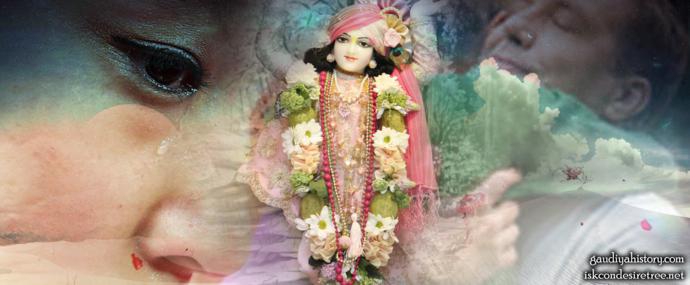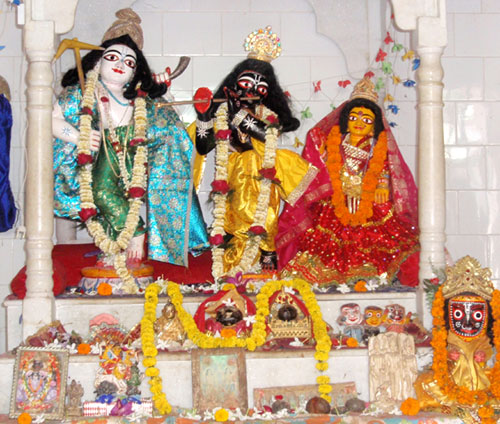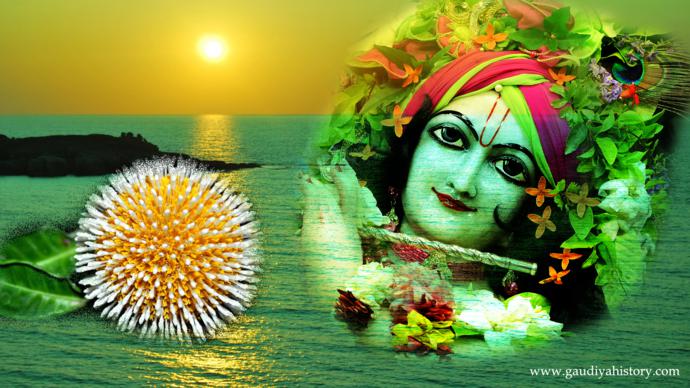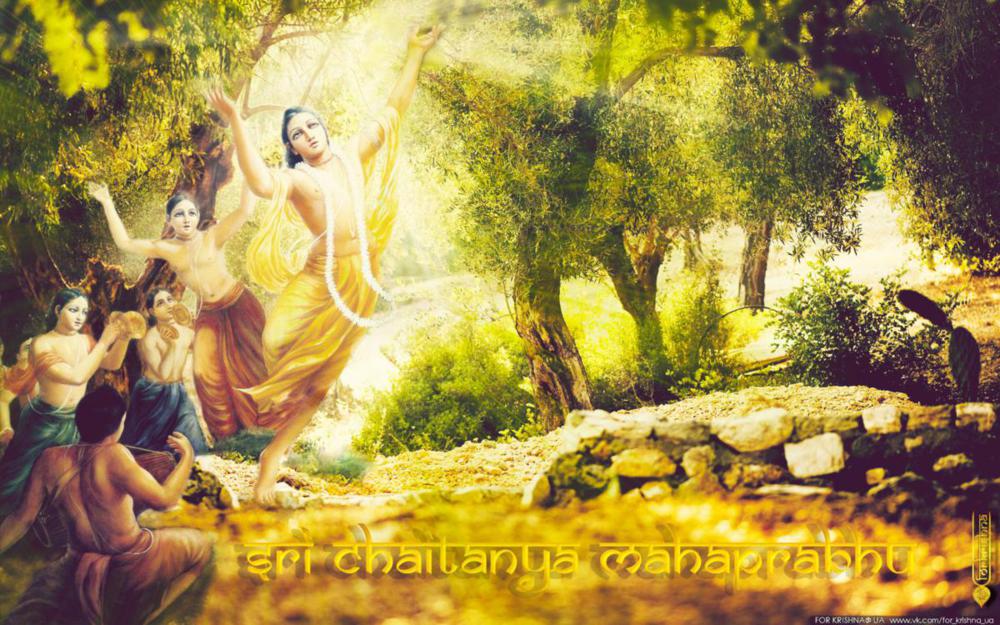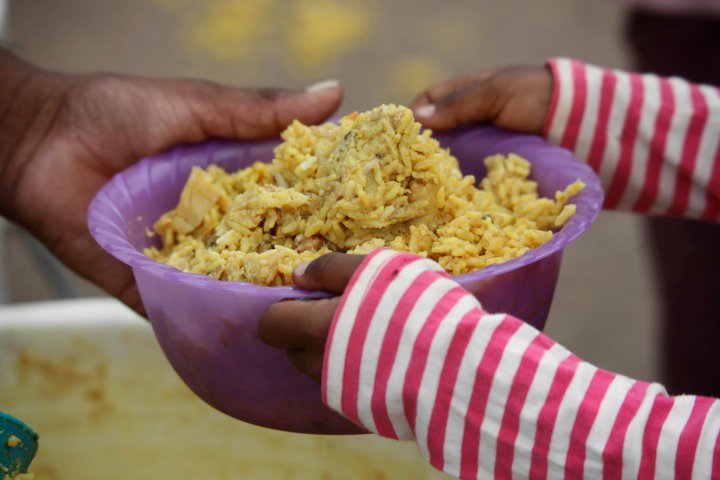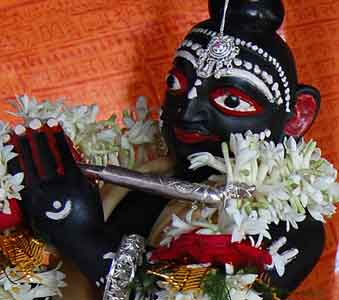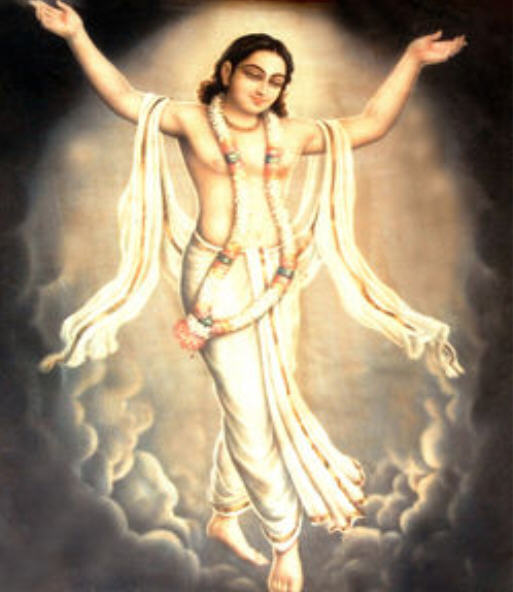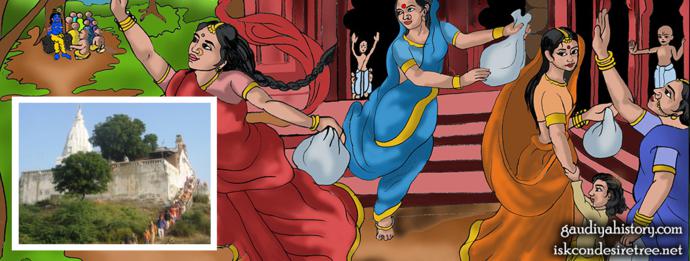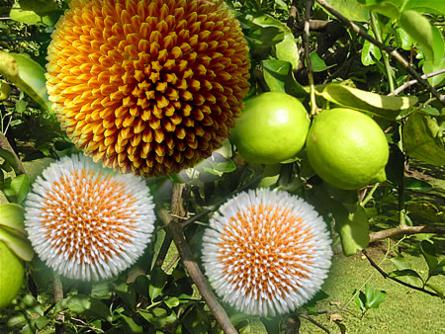It is mentiond in Nityananda Charitamrita, Antya Khanda Chapter 11:
Lord Gauranga instructs Nityananda Prabhu to marry
One day in Nilachala Puri Dhama, Gaurachandra Mahaprabhu discussed something alone with Nityananda.
tumi yao gaudadese karaha samsara
tabe e saba lokera haibe nistara
punaha asiba ami tomara mandire
tomara grihe habe amara avatare
bhakti bilaiya punah asiba samsara
gupu avatara sastre naheta pracara
acintya amara shakti keha nahi jane
sei se janaye tumi janaha sei khane
"Dear Shripada, return to Bengal and get married, then all the people will be delivered. I'll again manifest in Your family and stay in Your home. I'll distribute krishna-bhakti and deliver the whole world. These incarnations of Mine are secret and hidden in the scriptures. No one knows My inconceivable energies. Only You know them perfectly and others know only by Your mercy."
The following story adapted from the book Abhiram Lilamrta appeared in issue number 4 of Sri Krishna Kathamrita Bindu, the free fortnightly email magazine from ISKCON Gopal Jiu Publications.
Abhiram Thakur is perhaps the most prominent follower of Lord Nityananda Prabhu. According to Srila Kavi Karnapur, Abhiram Thakur is the incarnation of Sridama Sakha, the chief cowherd boy in krsna-lila. His pastimes were described in simple Bengali verse by his disciple Sri Tilak Ram Das in a book called Sri Abhirama Lilamrta. In the fourth chapter the author reveals how he was able to write:
utha utha ore sisya sunaha vacane
amara yateka lila karaha varnana
eta bali mora sathe carana dharila
carana parase lila svarana haila
[My guru Abhiram Thakur came to me while I was resting and said] "Wake up! Wake up! O disciple, hear my words! I want you to write about my pastimes." I touched my head to my guru's lotus feet and at that time all of his pastimes appeared to me. [Texts 5-6, 13]
The following story, adapted from chapter 15, verses 141-246, describes how Abhiram Thakur tested the newborn sons of Lord Nityananda.
UNCOMMON POWERS
Abhiram Thakur was a very powerful personality. It is said that he would sometimes test the authenticity of a salagrama-sila or a deity by offering obeisances. If they were not genuine, they would break. He had other uncommon powers as well.
On one occasion Abhiram Thakur met Nityananda Prabhu on the bank of the Ganga, near to the home of Nityananda Prabhu. Nitai offered Abhiram a seat. They embraced, and both sat down.
Nitai said, "O brother Abhiram, what is your desire? Why have you come to My home?"
"I want to see Your son."
Hearing this, Nityananda became happy. However, when Nityananda Prabhu showed him His son, Abhiram offered obeisances to the child and immediately the child died. When Nityananda Prabhu's wives Vasudha and Jahnava heard the news, they both fainted. Nityananda then placed the body of the child in the Ganga and they all took bath.
Sometime later, another child was born, and again Abhiram Thakur came. As before, when Abhiram offered his obeisances, the child died. Everyone was astonished, thinking, "What is Abhiram's purpose?" In this way, every time a child was born, Abhiram would come, offer obeisances, and the child would die.
NO INVITATION
Although Nityananda Prabhu is the Supreme Personality of Godhead Lord Balaram, still, while acting out His human-like pastimes, He externally became very unhappy seeing all of His sons die. Therefore, when the next child was born, Nitai thought to Himself, "If Abhiram does not come My child will live."
Nityananda Prabhu invited many quests for the festive occasion, but He did not invite Abhiram Thakur. Seeing that Abhiram was not there, Adwaita Acharya inquired from Nityananda, "Why have You not invited Abhiram?"
Nityananda Prabhu replied, "Abhiram has made Me bereft of sons. So I will not invite him. I've told all of the boatmen not to bring him across the Ganga in their boats."
During the time of the festival for the birth of Nityananda Prabhu's latest son, Abhiram and his wife Malini were staying at Krishnagar. Vakreswar Pandit came to see them. Malini offered him a seat, and Vakreswar inquired from Abhiram, "Nitai is performing a festival on the occasion of the birth of his son. You are the pradhana-gopal, the leader of the cowherd boys. Is He inviting you or not?"
Abhiram laughed and said, "No. He is not inviting me."
Vakreswar humbly told Abhiram, "Without your presence this ceremony cannot be performed properly. Although He is not inviting you, still you should go."
"How can I go without an invitation?"
Malini then said, "Abhiram is a rakhal, a cowherd boy. Such cowherders have no abhiman, false ego. He is not finding fault with Nityananda Prabhu for not inviting him."
Abhiram Thakur then told Vakreswar, "O brother, I'll go there later." After Vakreswar left, Abhiram conceived a plan. He bade Malini goodbye and started off, saying, "Gaura Hari ki jaya!" He went to the bank of the Ganga and said to a boatman, "Take me across!"
The boatman looked at Abhiram Thakur and inquired, "Who are you sir? Give me your name and then I will start the journey. If I take the wrong person across then Nityananda Prabhu will be very angry with me."
Abhiram replied, "Why does He want to restrict this person from crossing?" The boatman said, "Nityananda Prabhu is miserable and lamenting for His lost children. He told me, 'There is one person named Abhiram Thakur. He is very powerful. If he offers obeisances to My son then the child will die.' Saying this, Nityananda Prabhu told me not to bring that person across. I think that you are that same Abhiram Thakur."
Out of fear of Nityananda Prabhu, the boatman then put water in his boat and made it sink. Hearing that Abhiram Thakur had come, all of the other boatmen also filled their boats with water and sank them.
Abhiram Thakur then took some cloth and threw it in the river. The cloth floated, and, sitting on it, Abhiram crossed the river.
Seeing this, the people became astonished and ran to tell Nityananda Prabhu. Although Nitai became worried, He took all of the mahants who were present at the festival and went to meet Abhiram Thakur. Abhiram saw them all performing ecstatic kirtana and coming toward the bank of the Ganga to meet him. Abhiram then began playing his flute, and he lost external consciousness. Tilak Ram Das says, "Who can understand Abhiram Thakur?"
PRASAD AT NITAI'S HOME
When they came together, Abhiram embraced all of them with ecstatic love while his hairs stood on end. Nitai brought Abhiram into His home. Abhiram told Him, "I am very hungry. Please give me some prasad." Nitai gave him a seat in a room and Vasudha and Jahnava happily brought him nice prasad consisting of sweet rice, fancy rice and many opulent dishes. As much prasad as they brought, Abhiram ate it until he had finished everything in the house.
Seeing that he had eaten everything, Nitai said, "Dandavats to your pastimes! Who can understand You? In vraja-lila you are Sridama. Have you forgotten our loving relationship? In Vraja we all shared prasad together. But now, forgetting all of that, you are taking all of the prasad alone. In Vraja we would always share whatever fruits we got. What sort of behavior is this that you are taking all of the prasad alone?"
Abhiram listened and said, "My nature is that of a cowherd boy. First I take, then I give to others. My behaviour is that of Vraja. Knowing my nature and activities in Vraja, how can You say I took all of the prasad? Go and see Your pots." Then Abhiram performed acaman.
Nityananda Prabhu went to see the pots and found that double the original amount of prasad was there. Nitai then happily embraced Abhiram.
Abhiram said, "O brother, you should feed all of the mahants."
The mahants then happily took prasad and shouted, "Hari! Hari!" Finishing, they all performed acamana. Then Nitai gave them tambula and a place to take rest.
"SPARE OUR CHILD!"
Abhiram Thakur said, "Nitai, You have celebrated a festival for the birth of Your son. What sort of son do You have? Please bring him and I will offer my obeisances to him."
Hearing this, everyone became worried. Nityananda Prabhu's wives Vasudha and Jahnava approached Abhiram and humbly said, "This time please give protection to our child. Don't let us be criticized for not having a son. If you offer obeisances to our son then he will die. Every time this is what has happened. If you do this again, then we will also die."
Abhiram said, "Why are you fearing? You don't understand. I am offering my obeisances to test the child. If he is svayam-svarupa, the Lord's personal manifestation, then he will survive my obeisances."
Hearing Abhiram's words, Nityananda Prabhu became happy and brought His son before Abhiram. Abhiram Thakur offered his obeisances, and the child laughed. Abhiram become very happy and offered his obeisances a second and a third time, just to test the child. He saw that this child was jagat-priya, dear to the entire universe. Abhiram took the child on his lap and began to dance. He then told all of the mahants there:
ye na dekhecha gora dekha ara bar
punarbar sei gora vira avatar
"So that those who did not see Sri Chaitanya Mahaprabhu could again have the opportunity to see Him, the Lord has reappeared in the form of Virabhadra Prabhu."
THE IDENTITY OF VIRABHADRA PRABHU
Lord Balaram has appeared as Lord Nityananda Prabhu. As the Supreme Lord, He is sarvajna, all- knowing. Hence He certainly understood and, in fact, inspired the behavior of Abhiram Thakur. The nature of the Lord is that He likes to see His devotees glorified more than Himself. Therefore, to glorify His devotee Abhiram Thakur, and also His son Virabhadra Prabhu, Lord Nityananda inspired Abhiram Thakur to act in such an unusual way.
Virabhadra Prabhu is the incarnation of Kshirodakasayi Vishnu. Srila Kavi Karnapura has written (Sri Gaura-ganodesa-dipika text 67):
sankarsanasya yo vyuhah payo-visayi-namakah
sa eva viracandro 'bhuc caitanyabhinna-vigrahah
The expansion of Lord Sankarshan known as Kshirodakasayi Vishnu appeared in Sri Chaitanya Mahaprabhu's pastimes as Virachandra Prabhu. Lord Virachandra was non-different from Lord Chaitanya Himself.
sri-virabhadra gosani — skandha-mahasakha
tanra upasakha yata, asankhya tara lekha
(C.C. Adi 11.8)
After Nityananda Prabhu, the greatest branch is Virabhadra Gosani, who also has innumerable branches and subbranches. It is not possible to describe them all.
Srila Prabhupada writes in the purport:
Srila Bhaktisiddhanta Sarasvati Thakura writes in his Anubhashya – Virabhadra Gosani was the direct son of Srila Nityananda Prabhu and a disciple of Jahnava-devi. His real mother was Vasudha. In the Gaura-ganoddesa-dipika (67) he is mentioned as an incarnation of Kshirodakasayi Vishnu. Therefore Virabhadra Gosani is nondifferent from Sri Krishna Caitanya Mahaprabhu.
In a village of the name Jhamatapura, in the district of Hugli, Virabhadra Gosani had a disciple named Yadunathacarya, who had two daughters — a real daughter named Srimati and a foster daughter named Narayani. Both these daughters married (to Virabhadra Gosani), and they are mentioned in the Bhakti-ratnakara (Thirteenth Wave).
Virabhadra Gosani had three disciples who are celebrated as his sons – Gopijana-vallabha, Ramakrishna and Ramacandra. Srila Bhaktisiddhanta Sarasvati Thakura notes that since these three disciples belonged to different gotras, or dynasties, and also had different surnames and lived in different places, it is not possible to accept them as real sons of Virabhadra Gosani.
The eldest disciple, Gopijana-vallabha, was a resident of a village known as Lata, near the Manakara railway station in the district of Burdwan.
The second, Ramakrishna, lived near Maladaha, in a village named Gayesapura. Ramacandra had four sons, of whom the eldest was Radhamadhava, whose third son was named Yadavendra. Yadavendra's son was Nandakisora, his son was Nidhikrishna, his son was Caitanyacanda, his son was Krishnamohana, his son was Jaganmohana, his son was Vrajanatha, and his son was Syamalala Gosvami. This is the genealogical table given by Bhaktisiddhanta Sarasvati Thakura for the descendants of Virabhadra Gosani.
The youngest, Ramacandra, belonged to the Sandilya dynasty and had the surname Vatavyala. He established his family at Khadadaha, and its members are known as the gosvamis of Khadadaha.
